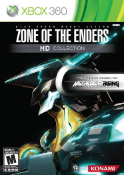Zone of the Enders HD Collection Review
|
|
See PixlBit's Review Policies

On 12/05/2012 at 10:00 PM by Nick DiMola Hopefully you aren’t planning on buying this edition of the game just for Metal Gear again. |

Ideal for casual fans and those who are interested in checking out the series. Diehard fans may be disappointed with the technical issues present.
While Kojima Productions is best known for its work on the Metal Gear series, last generation they were able to sneak out a couple of other titles that took place in a war torn world dominated by mechs, known as Orbital Frames. Zone of the Enders HD Collection brings both of the PlayStation 2 titles in the series onto one disc for both the Xbox 360 and PlayStation 3. While these games look much better and remain entertaining, they suffer from intermittent frame rate issues, as well as an overall slower pace that diehard fans will immediately notice.
Similar to all of Kojima’s work, Zone of the Enders maintains a tough to follow storyline that’s dense with lore and ancillary details. Both titles on the disc involve the Orbital Frame, Jehuty, and chronicle the quest of the runner that pilots the unique craft. The Artificial Intelligence known as ADA accompanies both runners and provides objectives along the way to help the runner fulfill Jehuty’s mission. Despite the overbearing jargon and plot devices, the underlying structure of the story boils down to a simple fight between good and evil, wherein the player assumes the role of the hero and protects the innocent bystanders from the murderous enemy.
More importantly, both titles are heavy on the action and offer up constant objectives to keep up the rapid pace. The first title is much less of a cinematic experience as it acts as more of a showcase of what’s to come. However, it makes for a good starting point despite being rough around the edges because it’s so short. Unfortunately, the game is light on information and outside of a tutorial that explains how to pilot the Orbital Frame, there’s nothing that indicates how to progress from mission to mission.
After some time with the game, I quickly came to realize that a guide is the only means by which I was going to determine what to do next. At times new areas will open up and traveling there is an obvious first step, but on occasion certain nodes through which you gain abilities will be locked by a passcode and finding where that passcode resides is a complete guess. Finding it can be a grating experience because the game isn’t presented as one contiguous world – players must leave areas and travel to new ones via an overworld-like map, which triggers a respawn of all of the enemies throughout the individual area. So whether you’re completing a mission-based objective, gathering a passcode, or gaining access to a weapon, progressing forward can be unnecessarily tedious and frustrating.
When you’re actually on the right track, Zone of the Enders can be a real treat. Upon arriving at any given area, you’ll be presented with a number of enemy squads that are floating around the landscape. Dispatching them all isn’t always requisite, but the combat is so solid, it’s exhilarating and fun to engage all of the enemies.
The combat thankfully remains constant into The 2nd Runner and is easily the biggest hook of the experience. Near or far, you’re presented with a wide variety of attacks that will change depending on the state of Jehuty. Going into burst mode at a distance allows players to shoot off a giant energy bomb, while doing this up close allows players to swipe a sword in a circle. Moving around the environment at high speed will allow tracking shots to fire, each of which is much weaker than a direct sword attack or the energy ball.
Given this flexibility, the game forces players to employ all of the tactics to defeat the variety of enemies in the game. For instance, Mummyheads block attacks at a far distance, requiring players to get up close and personal. But when close, they’ll release a devastating attack that must be dodged and subsequently countered with a head-on melee attack.
The 2nd Runner expands the ability set to include both grabbing and throwing of items and enemies, which provides a greater set of strategies that can and must be used to defeat all of the foes throughout the game. This isn’t the only improvement players will spot in the second title - The 2nd Runner takes all of the mission objective guesswork out of the experience.
Instead of randomly bouncing around from area to area, the game pushes you through a set of connected environments, enforcing the linear nature of the experience. Though the first game wasn’t explicitly linear, it offered a strict set of objectives that ultimately should’ve been presented as such. When combining this funneled and directed presentation with the accompanying anime cinematics, a greater variety and quantity of enemies, and the increased strategy, The 2nd Runner stands head and shoulders above its predecessor.
The nasty black mark that sits on the experience are the intermittent frame rate dips as well as the slightly slowed gameplay. If you’ve never played either title, it won’t be noticeable, but this decrease in speed does reduce the impact of the high-speed gameplay in certain scenarios. It’s not game breaking, but it’s an odd side effect of the HD port.
If not for these technical issues, Zone of the Enders HD Collection would be a must-buy title for fans of the original games. Those completely ignorant to the past experiences will be able to easily overlook these issues, but it’s likely that only The 2nd Runner will connect with modern audiences. However, if you’ve had a nagging desire to check out the series, Zone of the Enders HD Collection should work perfectly.













Comments